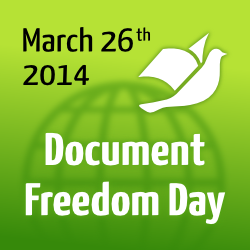 Today is Document Freedom Day which started out for documents in the OOXML days, but now is much more generally about Open Standards. This is a great opportunity to show you how Kolab uses Open Standards all the way down to the storage layer.
Today is Document Freedom Day which started out for documents in the OOXML days, but now is much more generally about Open Standards. This is a great opportunity to show you how Kolab uses Open Standards all the way down to the storage layer.
Since Kolab is a lot about email, it uses SMTP (RFC 821) and IMAP (RFC 1730) to send and store emails which is by itself not overly exciting since at least in the free world, most email software does that. But Kolab goes further and uses IMAP as a NoSQL storage engine and therefore gets all the scalability, ACLs and sharing from IMAP for free. It uses the IMAP METADATA Extension (RFC 5464) to storage other content and even configuration in IMAP folders. Since Kolab is a Groupware Solution, it stores contacts, events and tasks in there. Of course, it does so using Open Standards as well. Contacts are stored in the xCard (RFC 6351) format and tasks as well as events are stored in the xCal (RFC 6321) format. All those objects are then encapsulated in a MIME message according to RFC 2822.
The advantage of that is that your personal data is not scattered all over the place, but in one central IMAP database which you can easily back up (e.g. with offlineimap) or move to another server (e.g. with imapsync). The new version of Kolab supports file storage and the default is to store them in IMAP as well.
Unfortunately, not every IMAP client understands the METADATA extension and displays the other data as you would like. Therefore, Kolab offers other protocols to access that data. For your calendars, Kolab uses CalDAV (RFC 4791). Address book with contacts can be synchronized using CardDAV (RFC 6352) and files are available via WebDAV (RFC 2518).
For a proper groupware it is important that you can invite people to events or assign them tasks even if those people are using other systems on other servers. To achieve this, Kolab uses iTIP (RFC 5546) invitations and sometimes has to implement workarounds, because other clients are not respecting the standard fully. Unfortunately, this is a problem Kolab faces with all standards that are for inter-operating with other software.
To make sure all those different standards interact well together in one system and to be able to further enhance the functionality, the Kolab community uses a defined KEP process. KEP is short for Kolab Enhancement Proposal and works similar to Python’s PEP or XMPP’s XEP.
Happy Document Freedom Day! :)